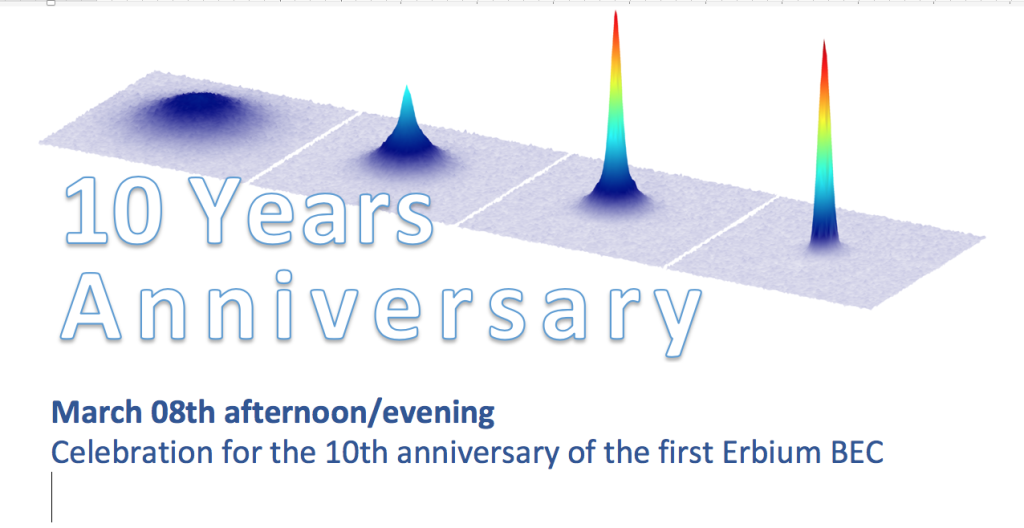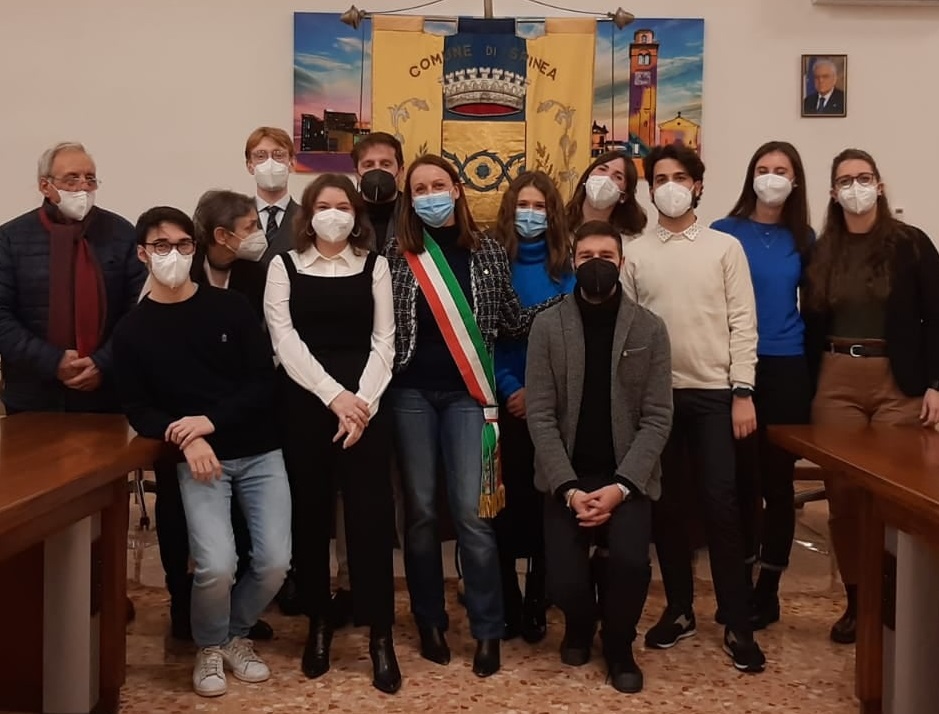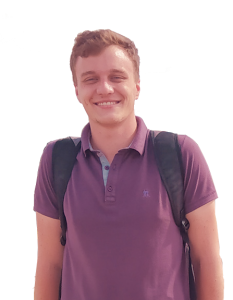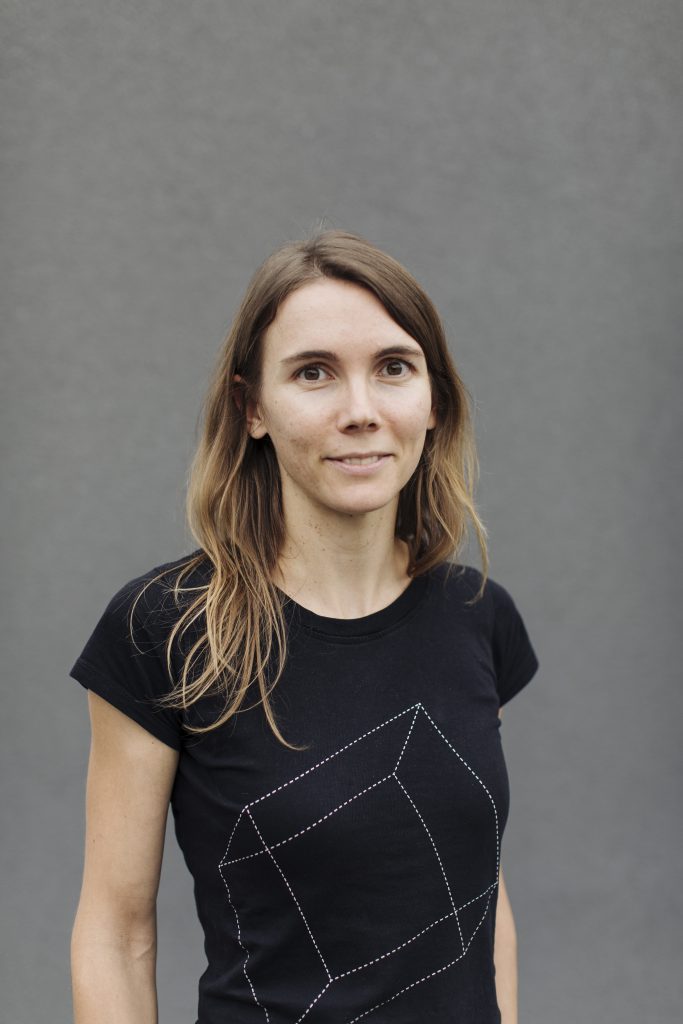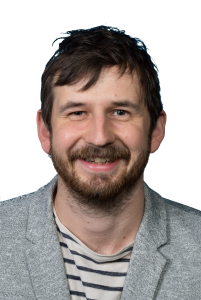
Welcome to the Quantum World!
Our group travelled to the Vienna City Hall for “Willkommen Quantenwelt” celebrating 100 years of quantum science. Thanks to Quantum Science Austria and collaborators for organizing this fantastic event!

2025 Group Openings!
We are happy to announce that our dipolar quantum gas group has an Academy Scientist + Postdoc and PhD positions open for 2025!

“Dance your PhD 2025” contest by Science and AAAS
Congratulations to our PhD student Arfor, who turned our research topics into a dazzling music video!

Vortices in a supersolid
2024’s Biggest Breakthroughs in Physics: Our research on the observation of vortices in a dipolar supersolid featured by Quanta magazine!

Austrian of the Year 2024
Francesca was crowned as the ‘Austrian of the Year’ in the research category at the Austria 24 gala by Die Presse!

Summer BBQ
Our 2024 Summer BBQ took place on the 24th of June and celebrated the many different achievements of the group!

Murder Mystery Dinner
Our 2024 group dinner took place on the 18th of January at CasoinN da Giorgio restaurant, with a 1920’s Murder Mystery theme!

Glitches in supersolids: links between neutron stars and quantum matter
By emulating the connection between a rotating supersolid phase and an external solid phase, we were able to replicate “glitches” – sudden jumps in the solid angular momentum driven by quantum vortices leaving the supersolid.

Cluster of Excellence Quantum Science Austria granted
Three Clusters of Excellence in Innsbruck have been funded! With highly endowed clusters of excellence, the Austrian Science Fund FWF creates Austrian flagships of basic research. The University of Innsbruck will coordinate the Cluster of Excellence for Quantum Sciences.

Bloch Oscillations
By letting an erbium quantum droplet fall under gravity through an optical lattice, it is possible to understand the inter-atomic interactions and quantum fluctuations through variations of the Bloch oscillation.
Our group studies dipolar quantum gases made of Erbium (Er) and Dysprosium (Dy) atoms. These extraordinarily magnetic species are a powerful new resource for reaching quantum simulation with strong connectivity, in which each atom is coupled to the other over long distances, and exploring exotic phases of matter that have no classical counterpart.
We have four labs: the ERBIUM LAB, where Er was Bose condensed for the first time ever; the Er-Dy LAB, which studies quantum dipolar mixtures under a quantum-gas microscope; the T-REQs LAB, where we trap Er atoms in arrays of optical tweezers for Rydberg physics; and the Dy-Yb LAB, currently under construction – this new experimental apparatus will be used to study many-body phases of highly-magnetic dysprosium and of mixtures with non-magnetic ytterbium. The Theory Group completes our team studying and predicting dipolar phenomena in dipolar quantum gases and mixtures.
The group, led by Francesca Ferlaino, is jointly located at the Institute for Experimental Physics (IExP) of the University of Innsbruck and at the Institute for Quantum Optics and Quantum Information (IQOQI) of the Austrian Academy of Sciences, and it is part of the Innsbruck Center for Ultracold Atoms and Quantum Gases.
Follow our group’s updates on Bluesky  and LinkedIn
and LinkedIn  !
!
News from the labs
Now in Physical Review A! In collaboration with our theory colleagues from Paris (M. Lepers, J.-F. Wyart and O. Dulieu) we have determined the dynamical polarizability of ultracold erbium atoms in the ground and in one excited state at three particular relevant wavelengths.
Keep Reading ...
n experiments with magnetic atoms conducted at extremely low temperatures, scientists have demonstrated a unique phase of matter: The atoms form a new type of quantum liquid or quantum droplet state. These so called quantum droplets may preserve their form in absence of external confinement because of quantum effects. The
Keep Reading ...
Now in Physical Review X! Together with our theory colleagues from Hannover (Luis Santos and Falk Wächtler), we have investigated the formation of a macrodroplet state in an ultracold bosonic gas of erbium atoms. Our paper has been now published in PRX and featured in Physics!
Keep Reading ...
Group news
On the International Women's Day March 8, 2012 a team led by Francesca Ferlaino created the very first BEC from highly-magnetic erbium atoms in their lab at the University of Innsbruck.
Keep Reading ...
Elena has been awarded the prize “Ho una laurea nella manica” established by her hometown for young people who graduated cum laude in 2020.
Keep Reading ...
Our new pre-print with collaborators at ICFO, Barcelona, investigates the topological properties of the bond order wave in the extended Fermi-Hubbard model.
Keep Reading ...
Welcome and goodbye
Welcome to Daniel Grün, who is joining the Erbium team in the frame of our Excellence Fellowship for master students.
Keep Reading ...
After 5 productive years in the Dipolar Quantum Gas Group, Lauriane Chomaz is moving to the University of Heidelberg as Tenure-Track Professor. Congratulation Lauriane! We wish you great success in your next adventure in physics
Keep Reading ...
 and LinkedIn
and LinkedIn ![]() !
!











